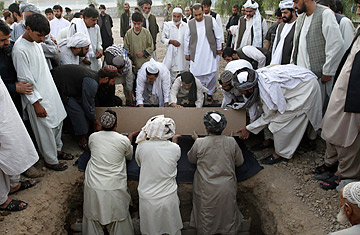
Afghans bury the coffin of Kandahar city mayor, Ghulam Haidar Hamidi, who was killed after a suicide blast in Kandahar July 27, 2011.
An honest man in a city of thieves, Kandahar mayor Ghulam Haider Hamidi once exemplified hopes that the U.S.-led nation-building effort would leave behind a better Afghanistan. His killing by a suicide bomber on Wednesday, less than two weeks after the slaying of Kandahar's strongman provincial council chairman Ahmed Wali Karzai, underscores the declining prospects of the Western military mission there.
"More than 50 percent of the violence comes from these corrupt people, the ones who sit with you and smile," Hamidi told the Washington Post earlier this year. The former accountant had returned to Kandahar in 2007 after 30 years in the United States. Having been invited to serve as mayor by his childhood friend Afghan President Hamid Karzai, Hamidi said goodbye to the comfort of his northern Virginia home and threw himself into the maelstrom of the southern Afghan city's politics. He initiated a slew of projects — from paving roads, collecting taxes and building schools — intended to revitalize the city, and made a name for himself trying to root out graft and curb the power of local strongmen and warlords on whom he blamed Kandahar's ills.
Some of the enemies he made in the course of trying to clean up Kandahar appear to have caught up with him Wednesday. Clashes had erupted in the city Tuesday afternoon, with police accused of accidentally shooting three children as bulldozers moved in to demolish houses built illegally on government land. The following morning Hamidi met with elders who had come to protest. He heard their grievances in the corridor outside his office. Shortly before 11 a.m. a man stepped out of the crowd, took Hamidi's hand and detonated explosives hidden in his turban. The blast caught Hamidi square in the face, killing him instantly.
The Taliban claimed responsibility for the hit, saying it was to avenge the children killed the previous day. But an official with Afghanistan's secret police offered a more nuanced version of events. "All those illegal houses Hamidi destroyed belonged to powerful [former] jihadi commanders living in the district," the official, who spoke on condition of anonymity, told TIME. Hamidi had been the first person to stand up to these warlords, the official went on, turfing them off land they'd stolen from the government or the poor. "The warlords didn't like Hamidi, so they turned to the Taliban, who killed him."
It's a cynical reflection of Kandahari politics that Hamidi survived four years of an escalating Taliban insurgency only to die when he angered commanders whose personal financial interests diverged from those of the government. The episode is also a fitting illustration of Kandahar's war economy, where a murky nexus of insurgents, criminals, strongmen and government officials vie for resources, often with overlapping interests and shifting allegiances.
The killing is also the latest blow to Karzai, who has lost a string of key allies in southern Afghanistan just as NATO looks to start sending its troops home. Last week, gunmen killed Jan Mohammad Khan, a confidante and erstwhile mentor of the president, as he sat down for dinner with a parliamentarian at his villa in Kabul. On July 12, a trusted lieutenant killed Ahmed Wali Karzai, de facto ruler of Kandahar. Both of Hamidi's deputies were assassinated last year, and Kandahar's chief of police was killed in April.
Analysts believe the Taliban intent is to mirror the intensity of Nato's own campaign of 'kill/capture' raids against insurgent commanders. "Partially that has an impact in the battlefield, and partly on morale, and part is also to project a certain position of strength," says Martine van Bijlert of the Afghanistan Analysts Network, a repected Kabul think-tank.
But Hamidi's death has a significance beyond simply reflecting the violent, murky nature of Kandahari politics, or bolstering the Taliban narrative that no government official, no matter how close to Karzai, is safe. Hamidi had been one of the leading contenders to become Kandahar's next governor, a position that would likely convey considerable power. Close to the Karzais, but without a powerbase of his own, he would have been a conduit President Karzai could have used to project his family influence across southern Afghanistan in the absence of Ahmed Wali. Well-connected Kandaharis saw him as a serious contender for the job. His removal from the scene leaves the way open for Gul Agha Sherzai, a strongman who dispenses patronage like an old-fashioned potentate. A nominal Karzai ally, Sherzai is excepted by many observers to direct lucrative NATO contracts and revenues from all manner of formal and informal economic activity towards his own family if he gets the nod, diminishing Karzai's influence in the south.
Hamidi's death, then, is another blow to Karzai's prospects for holding Kandahar once foreign troops leave the southern crucible. But who benefits from that weakening in the long-term may be a question still in play.
